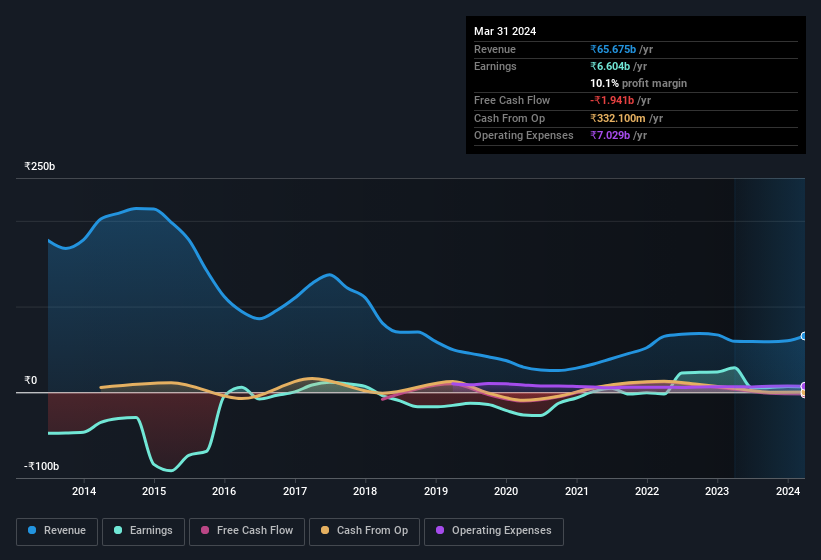- India
- /
- Electrical
- /
- NSEI:SUZLON
Why Suzlon Energy's (NSE:SUZLON) Shaky Earnings Are Just The Beginning Of Its Problems

Investors were disappointed by Suzlon Energy Limited's (NSE:SUZLON ) latest earnings release. Our analysis has found some reasons to be concerned, beyond the weak headline numbers.
See our latest analysis for Suzlon Energy

Zooming In On Suzlon Energy's Earnings
One key financial ratio used to measure how well a company converts its profit to free cash flow (FCF) is the accrual ratio. To get the accrual ratio we first subtract FCF from profit for a period, and then divide that number by the average operating assets for the period. This ratio tells us how much of a company's profit is not backed by free cashflow.
Therefore, it's actually considered a good thing when a company has a negative accrual ratio, but a bad thing if its accrual ratio is positive. While it's not a problem to have a positive accrual ratio, indicating a certain level of non-cash profits, a high accrual ratio is arguably a bad thing, because it indicates paper profits are not matched by cash flow. To quote a 2014 paper by Lewellen and Resutek, "firms with higher accruals tend to be less profitable in the future".
Suzlon Energy has an accrual ratio of 0.27 for the year to March 2024. Unfortunately, that means its free cash flow fell significantly short of its reported profits. Even though it reported a profit of ₹6.60b, a look at free cash flow indicates it actually burnt through ₹1.9b in the last year. It's worth noting that Suzlon Energy generated positive FCF of ₹3.7b a year ago, so at least they've done it in the past. Unfortunately for shareholders, the company has also been issuing new shares, diluting their share of future earnings.
That might leave you wondering what analysts are forecasting in terms of future profitability. Luckily, you can click here to see an interactive graph depicting future profitability, based on their estimates.
One essential aspect of assessing earnings quality is to look at how much a company is diluting shareholders. In fact, Suzlon Energy increased the number of shares on issue by 9.1% over the last twelve months by issuing new shares. That means its earnings are split among a greater number of shares. To celebrate net income while ignoring dilution is like rejoicing because you have a single slice of a larger pizza, but ignoring the fact that the pizza is now cut into many more slices. You can see a chart of Suzlon Energy's EPS by clicking here.
How Is Dilution Impacting Suzlon Energy's Earnings Per Share (EPS)?
Unfortunately, we don't have any visibility into its profits three years back, because we lack the data. Even looking at the last year, profit was still down 77%. Sadly, earnings per share fell further, down a full 81% in that time. And so, you can see quite clearly that dilution is influencing shareholder earnings.
In the long term, if Suzlon Energy's earnings per share can increase, then the share price should too. However, if its profit increases while its earnings per share stay flat (or even fall) then shareholders might not see much benefit. For the ordinary retail shareholder, EPS is a great measure to check your hypothetical "share" of the company's profit.
Our Take On Suzlon Energy's Profit Performance
In conclusion, Suzlon Energy has weak cashflow relative to earnings, which indicates lower quality earnings, and the dilution means that shareholders now own a smaller proportion of the company (assuming they maintained the same number of shares). For the reasons mentioned above, we think that a perfunctory glance at Suzlon Energy's statutory profits might make it look better than it really is on an underlying level. So while earnings quality is important, it's equally important to consider the risks facing Suzlon Energy at this point in time. For example, we've found that Suzlon Energy has 3 warning signs (1 shouldn't be ignored!) that deserve your attention before going any further with your analysis.
Our examination of Suzlon Energy has focussed on certain factors that can make its earnings look better than they are. And, on that basis, we are somewhat skeptical. But there are plenty of other ways to inform your opinion of a company. Some people consider a high return on equity to be a good sign of a quality business. So you may wish to see this free collection of companies boasting high return on equity, or this list of stocks with high insider ownership.
New: Manage All Your Stock Portfolios in One Place
We've created the ultimate portfolio companion for stock investors, and it's free.
• Connect an unlimited number of Portfolios and see your total in one currency
• Be alerted to new Warning Signs or Risks via email or mobile
• Track the Fair Value of your stocks
Have feedback on this article? Concerned about the content? Get in touch with us directly. Alternatively, email editorial-team (at) simplywallst.com.
This article by Simply Wall St is general in nature. We provide commentary based on historical data and analyst forecasts only using an unbiased methodology and our articles are not intended to be financial advice. It does not constitute a recommendation to buy or sell any stock, and does not take account of your objectives, or your financial situation. We aim to bring you long-term focused analysis driven by fundamental data. Note that our analysis may not factor in the latest price-sensitive company announcements or qualitative material. Simply Wall St has no position in any stocks mentioned.
About NSEI:SUZLON
Suzlon Energy
Manufactures and sells wind turbine generators and related components in India and internationally.
Flawless balance sheet with high growth potential.
Similar Companies
Market Insights
Community Narratives



